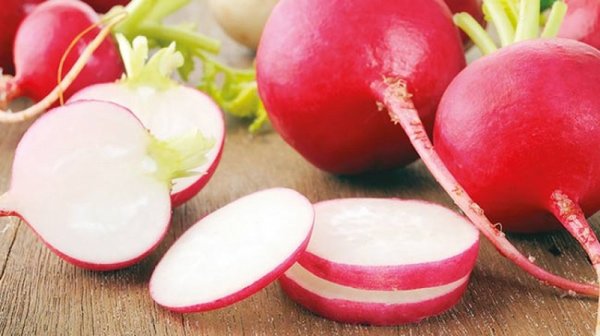In addition to bringing a striking color to the plate, beets are also very nutritious, containing many vitamins, minerals and essential plant compounds, helping to prevent and support the treatment of diseases…
1. Beets are nutritious and low in calories
Beets are low in calories but contain many valuable vitamins and minerals. Here are the nutrients found in a 100 gram serving of boiled beets:
- Calories : 44
- Protein : 1.7 grams
- Fat: 0.2 grams
- Carbs: 10 grams
- Fiber: 2 grams
- Folate: 20% Daily Value (DV)
- Manganese: 14% DV
- Copper: 8% DV
- Potassium: 7% DV
- Magnesium: 6% DV
- Vitamin C: 4% DV
- Vitamin B6: 4% DV
- Iron: 4% DV
Beets are particularly rich in folate, a vitamin that plays an important role in growth, development, and heart health.
They also contain a good amount of manganese, which is involved in bone formation, nutrient metabolism, and more. Additionally, they are high in copper, an important mineral needed for energy production and the synthesis of certain neurotransmitters.
2. Helps Control Blood Pressure
Some studies have shown that beetroot juice can significantly reduce both systolic and diastolic blood pressure. Raw beets are more effective than cooked beets.
This blood pressure-lowering effect is due to the high concentration of nitrates in this root vegetable. In the body, dietary nitrates are converted into nitric oxide, a molecule that dilates blood vessels and lowers blood pressure.
Beets are also an excellent source of folate. Although research has shown mixed results, some studies have shown that increasing folate intake can significantly reduce blood pressure.
However, keep in mind that the effects of beets on blood pressure are only temporary. Therefore, you need to consume them regularly to get the long-term heart health benefits.
3. May Help Fight Inflammation
Beets contain pigments called betalains, which have some anti-inflammatory properties. Chronic inflammation is linked to conditions like obesity, heart disease, liver disease, and cancer.
A study in a group of people with high blood pressure found that consuming 250 ml of beetroot juice for 2 weeks significantly reduced several markers of inflammation, including C-reactive protein (CRP) and tumor necrosis factor-alpha (TNF-a).
In addition, an older 2014 study in people with osteoarthritis found that betalain capsules made from beetroot extract reduced pain and discomfort in the patients.
Beetroot juice and extract have also been shown to reduce kidney inflammation in rats. However, more research in humans is needed to determine whether beets in normal amounts as part of a healthy diet can provide similar anti-inflammatory benefits.

Beetroot juice may help fight inflammation.
4. Improve Digestive Health
Beets are rich in fiber. Fiber promotes the growth of beneficial bacteria. Because it regulates the gut microbiota, fiber also helps to enhance the digestive absorption process in the intestines.
This can promote digestive health, helping to prevent digestive conditions such as constipation, inflammatory bowel disease (IBS) and diverticulitis.
Furthermore, fiber has been linked to helping reduce the risk of chronic diseases, including colon cancer, heart disease and type 2 diabetes.
5. Support Brain Health
Mental and cognitive functions naturally decline with age, which can increase the risk of neurodegenerative disorders such as dementia.
The nitrates in beets can improve brain function by promoting the dilation of blood vessels and thereby increasing blood flow to the brain.
In particular, beets have been shown to improve blood flow to the frontal lobe of the brain, an area involved in higher-level thinking such as decision-making and memory…
Furthermore, a study in people with type 2 diabetes found that reaction times during cognitive function tests were 4% faster in those who consumed 250 ml of beetroot juice daily for 2 weeks, compared to a control group.
However, more research is needed to determine whether beets can be used to improve brain function and reduce the risk of dementia in the general population.
6. May Have Some Anti-Cancer Properties
Beets contain several compounds with anti-cancer properties, including betaine, ferulic acid, rutin, kaempferol, and caffeic acid…
Test-tube studies have shown that beetroot extract can slow the division and growth of cancer cells.
Several other studies have found that having higher blood levels of betaine may be associated with a reduced risk of developing cancer.
However, it is important to note that most studies on this topic have used isolated compounds rather than beets. Therefore, further research is needed on beet consumption as part of a well-balanced diet and cancer risk.
7. Balance your energy intake to help you lose weight
Beets are low in fat and calories but high in water, which can help balance your energy intake. Increasing your intake of low-calorie foods like this vegetable has also been linked to weight loss.
Furthermore, despite being low in calories, they contain moderate amounts of protein and fiber. Both of these nutrients can help you achieve and maintain a healthy weight.
The fiber in beets can also support digestive health, reduce appetite, and promote feelings of fullness, thereby reducing your overall calorie intake.
Additionally, by incorporating them into recipes or smoothies, you can easily increase your intake of fruits and vegetables to improve the quality of your diet.





